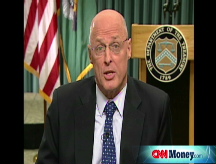Mortgage rates at 8-month high
Freddie Mac says 30-year fixed rates rise to 6.32% as Federal Reserve officials express concern over inflation.
NEW YORK (CNNMoney.com) -- Rates on 30-year fixed mortgages have surged nearly a quarter percentage point to an 8-month high on growing concerns about inflation, mortgage backer Freddie Mac said Thursday.
Freddie Mac (FRE, Fortune 500) said 30-year fixed-rate mortgages averaged 6.32% with an average of 0.7 point in the week ending Thursday, up from 6.09% last week. Last year at this time, the 30-year loan averaged 6.74%.
The last time the 30-year fixed rate mortgage was higher was the week ended Oct. 25, when it averaged 6.33%.
"Mortgage rates jumped this week after a number of Federal Reserve officials, most notably Chairman (Ben) Bernanke and Vice Chair (Donald) Kohn, expressed concern over a threat of inflation," said Frank Nothaft, Freddie Mac vice president and chief economist, in a statement.
"This led some market participants to believe that the Fed will raise rates more aggressively over the year than previously thought," Nothaft added.
The 15-year fixed-rate mortgage this week averaged 5.93% with an average 0.6 point, up from last week when it averaged 5.65%. A year ago at this time, the 15-year fixed rate mortgage averaged 6.43%.
The last time the 15-year fixed-rate mortgage was higher was the week ended Oct. 25, when it averaged 5.99%.
"Inflation concerns are still continuing, so that would suggest some upward pressure on interest rates," said Keith Gumbinger, Vice President of HSHAssociates.com, an online publisher of consumer loan information.
Five-year adjustable-rate mortgages (ARMs) averaged 5.70% this week, with an average 0.7 point, up from last week when it averaged 5.51%. A year ago, the 5-year ARM averaged 6.37%.
One-year ARMs averaged 5.09% this week with an average 0.6 point, up from last week when it was 5.06%. At this time last year, the 1-year ARM averaged 5.75%.
Other news in the housing market has been more mixed. The number of homes under contract to be sold rose 6.3% in April, according to National Association of Realtors, showing that buyers were out shopping for bargains.
As interest rates move higher, buyers leave the market, and the lack of demand pushes home prices lower, according to Gumbinger. "The higher interest rates put renewed pressure on home prices," he said.
Single-family home prices dropped 7.7% in the first quarter, according to the National Association of Realtors. The year-over-year drop was the largest decline since the association began reporting on home prices in 1982.
"Serious delinquencies (loans overdue 90 days or more or in foreclosure) for both prime and subprime conventional mortgages nearly doubled between first quarter of 2007 and 2008, according to the Mortgage Bankers Association," added Nothaft. ![]()


